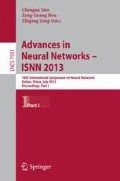Abstract
FAM is an Associative Memory that uses operators of Fuzzy Logic and Mathematical Morphology (MM). FAMs possess important advantages including noise tolerance, unlimited storage, and one pass convergence. An important property, deciding FAM performance, is the ability to capture contents of each pattern, and associations of patterns. Standard FAMs capture either contents or associations of patterns well, but not both of them. In this paper, we propose a novel FAM that effectively stores both contents and associations of patterns. We improve both learning and recalling processes of FAM. In learning process, the associations and contents are stored by mean of input and output patterns and they are generalised by erosion operator. In recalling process, a new threshold is added to output function to improve outputs. Experiments show that noise tolerance of the proposed FAM is better than standard FAMs with different types of noise.
Access this chapter
Tax calculation will be finalised at checkout
Purchases are for personal use only
Preview
Unable to display preview. Download preview PDF.
References
Cheng, Q., Fan, Z.T.: The stability problem for fuzzy bidirectional associative memories. Elsevier Science, Fuzzy Sets and Systems 132(1), 83–90 (2002)
Fulai, C., Tong, L.: Towards a High Capacity Fuzzy Associative Memory Model. In: IEEE World Congress on Computational Intelligence, 1994 IEEE International Conference on Neural Networks (1994)
Fulai, C., Tong, L.: On fuzzy associative memories with multiple-rule storage capacity. IEEE Transactions on Fuzzy System 4(3) (1996)
Junbo, F., Fan, J., Yan, S.: An Encoding Rule of FAM. In: Singapore ICCS/ISITA 1992, pp. 1415–1418 (1992)
Junbo, F., Fan, J., Yan, S.: A learning rule for FAM. In: 1994 IEEE International Conference on Neural Networks, pp. 4273–4277 (1994)
Kim, M.: Fuzzy Associative Memory-Driven Approach to Knowledge Integration. In: 1999 IEEE International Fuzzy Systems Conference Proceedings, pp. 298–303 (1999)
Kosko, B.: NeuralNetworks and Fuzzy Systems: A Dynamical Systems Approach to Machine Intelligence. Prentice Hall, Englewood Cliffs (1992)
Li, L., Yang, J., Wu, W., Wu, T.: An intuitionistic fuzzy associative memory network and its learning rule. In: GRC 2009, IEEE International Conference on Granular Computing, pp. 2–5 (2009)
Ping Xiao, F.Y., Yu, Y.: Max-Min Encoding Learning Algorithm for Fuzzy Max-Multiplication Associative Memory Networks. In: 1997 IEEE International Conference on Systems, Man, and Cybernetics (1997)
Ritter, G.X., Sussner, P., Diza-de Leon, J.L.: Morphological associative memories. IEEE Transactions on Neural Networks 9(2), 281–293 (1998)
Shahir, S., Chen, X.: Adaptive fuzzy associative memory for on-line quality control. In: Proceedings of the 35th South-eastern Symposium on System Theory, pp. 357–361 (2003)
Wang, S., Lu, H.J.: On New Fuzzy Morphological Associative Memories. IEEE Transactions on Fuzzy Systems 12(3), 316–323 (2004)
Sussner, P., Valle, M.E.: Implicative Fuzzy Associative Memories. IEEE Transactions on Fuzzy System 14(6), 793–807 (2006)
Sussner, P., Valle, M.E.: Fuzzy Associative Memories and Their Relationship to Mathematical Morphology. In: Handbook of Granular Computing, pp. 1–41 (2008)
Valle, M.E., Sussner, P.: Fuzzy associative memories from the perspective of mathematical morphology. IEEE Transactions on Fuzzy System, Mm (2007)
Wang, Z., Zhang, J.: Detecting Pedestrian Abnormal Behavior Based on Fuzzy Associative Memory. In: Fourth International Conference on Natural Computation, pp. 143–147 (2008)
Zeng, S., Xu, W., Yang, J.: Research on Properties of Max-Product Fuzzy Associative Memory Networks. In: Eighth International Conference on Intelligent Systems Design and Applications, pp. 438–443 (2008)
Zhang, Z., Zhou, W., Yang, D.: Global exponential stability of fuzzy logical BAM neural networks with Markovian jumping parameters. In: 2011 Seventh International Conference on Natural Computation, pp. 411–415 (2011)
Author information
Authors and Affiliations
Editor information
Editors and Affiliations
Rights and permissions
Copyright information
© 2013 Springer-Verlag Berlin Heidelberg
About this paper
Cite this paper
Hoa, N.T., Bui, T.D., Dang, T.K. (2013). Efficiency Improvements for Fuzzy Associative Memory. In: Guo, C., Hou, ZG., Zeng, Z. (eds) Advances in Neural Networks – ISNN 2013. ISNN 2013. Lecture Notes in Computer Science, vol 7951. Springer, Berlin, Heidelberg. https://doi.org/10.1007/978-3-642-39065-4_5
Download citation
DOI: https://doi.org/10.1007/978-3-642-39065-4_5
Publisher Name: Springer, Berlin, Heidelberg
Print ISBN: 978-3-642-39064-7
Online ISBN: 978-3-642-39065-4
eBook Packages: Computer ScienceComputer Science (R0)

